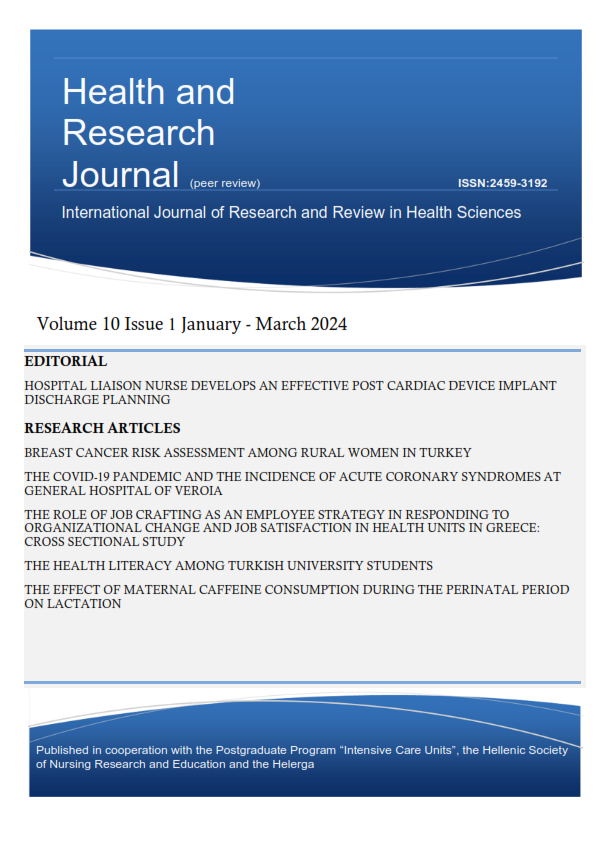The role of job crafting as an employee strategy in responding to organizational change and job satisfaction in health units in Greece: Cross sectional study

Abstract
Background: In recent decades, in the context of organizational change, Job crafting is the process in which the redesign of work takes place, employees change their labor boundaries and labor relations to find meaning in them.
Material and Method: Data were collected from 112 health care workers from the public and private sector regardless of specialty with a random sampling method. The data was collected by a questionnaire that included three parts: demographics, scale of organizational commitment, job satisfaction. The data was analyzed with SPSS version 24.0 using descriptive statistics, Pearson correlation, variance analysis and t-test.
Purpose: To investigate job crafting as a strategy of employees in Health Units in Greece regarding organizational change and the factors that affect job satisfaction.
Results: A statistically significant positive correlation was identified between the RCT scale and the MSQ satisfaction scale (r=0.299, p=0.002<a=0.05). The hypothesis of homogeneity of variations is not rejected for the Job crafting and RCT scales by Levene's test (p-values>a=0.05), while it is rejected for the MSQ scale (F=3.757, p-value=0.027<a=0.05). Subsequently, there was no statistically significant relationship between the Job Crafting scales, RCT of the questionnaire and age group (p-values>a=0.05) with application of One Way ANOVA. There was also no statistically significant difference (χ2(3)=2.068, p-value=0.558>a=0.05) so there is no differentiation in the degree of agreement of the MSQ scale per educational level. Finally, the hypothesis of equality of population fluctuations is not rejected (Vene test, F=2,507, p=0,116) and a statistically significant relationship between the Job Crafting scale in relation to the employment agency (t=-2,607, p=0,01) emerged.
Conclusions: Job crafting has a positive impact on organizational change and job satisfaction is positively linked to the implementation of Job crafting. Planning and managing organizational change is a complex and difficult task for organizational managers. Reactions to organizational change can be multiple, often ambiguous and complex. Employees can respond to change in unexpected ways. They don't just face change, but they may also be actively involved with it and play an active role in influencing its direction. On the one hand, organizations and, on the other hand, managers should turn to work redesign interventions, leave room for employees to change their work routine and provide them with opportunities to "match" their work to their strengths, skills and preferences.
Article Details
- How to Cite
-
Digonis, S., & Giannouli, A. (2024). The role of job crafting as an employee strategy in responding to organizational change and job satisfaction in health units in Greece: Cross sectional study. Health & Research Journal, 10(1), 27–39. https://doi.org/10.12681/healthresj.34579
- Section
- Original Articles
Copyright notice:
Authors retain copyright of their work and grant the Health and Research Journal the right of first publication.
License:
Articles are published under the Creative Commons Attribution 4.0 International License (CC BY 4.0). This license permits use, sharing, adaptation, distribution, and reproduction in any medium or format, including for commercial purposes, provided that appropriate credit is given to the author(s) and the original publication in this journal, a link to the license is provided, and any changes are indicated.
Attribution requirement:
Any reuse must include the article citation and DOI (where available), and indicate if changes were made.


